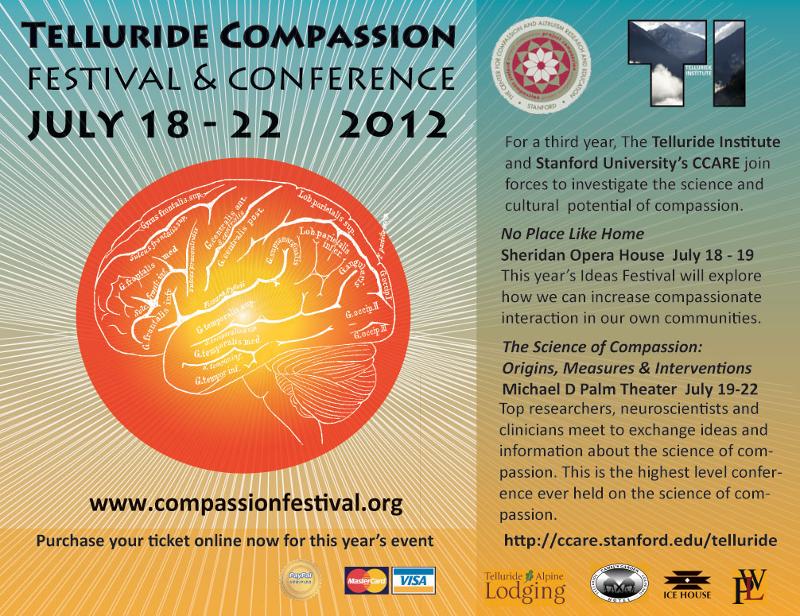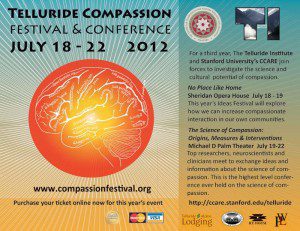
11 Jul THE SCIENCE OF COMPASSION CONFERENCE, 7/19 – 7/22
 At least a dozen words in this cloud describe pretty much the same thing: a feeling human beings have for one another, especially when they see someone else in need. And that is a really good sign! The feeling must be almost as important to us as snow is to the Inuit, who have more than 20 words for its various forms, shapes, degrees of moisture, and so on.
At least a dozen words in this cloud describe pretty much the same thing: a feeling human beings have for one another, especially when they see someone else in need. And that is a really good sign! The feeling must be almost as important to us as snow is to the Inuit, who have more than 20 words for its various forms, shapes, degrees of moisture, and so on.
While it is pretty obvious that a sick, handicapped or poor person would find a bit of loving kindness essential, the same is not necessarily evident for one who is doing well in body, spirit and income. Yet, most people like to do good, enjoy helping and actually engage in casual acts of loving kindness throughout any ordinary day. A smile at a stranger, looking out for that bicyclist, feeding the birds in winter…
Why do we do it?
Because it makes us feel healthier and happier. And that’s a rock solid scientific fact.
The biggest brains in the field of neuroscience with emphasis on compassion research converge on Telluride next week at the largest ever conference in the field. “The Science of Compassion: Origins, Measures and Interventions” will be held at the Michael D Palm Theater at a gathering organized by Stanford University’s CCARE (the Center for Compassion and Altruism Research and Education), and the Telluride Institute. The momentous event takes place Thursday, July 19 – Sunday, July 22, immediately following the Telluride Institute’s Ideas Festival, also about compassion, but focused on the home front.
Among the 30 illustrious speakers and panelists is Richie Davidson, PhD, who first appeared in Telluride at Mountainfilm. Davidson’s research shows that happiness and compassion are skills like playing the violin or skiing. It is possible, he says, to train our minds to be happy! Time Magazine named him one of the 100 most influential people in the world in 2006.
Davidson is joined by psychologist Paul Ekman, a pioneer in the study of emotions and their relation to facial expressions; Barbara Fredrickson, whose research centers on positive emotions and human flourishing; Kristin Neff, a long-time meditator, who has done pioneering research into self-compassion and developed an eight-week program to teach self-compassion.
Personally I am also really excited to hear Philip Zimbardo, internationally recognized as a leading “voice and face of contemporary psychology” through his widely seen PBS-TV series, “Discovering Psychology,” his media appearances, best-selling trade books on shyness, and his classic research, “The Stanford Prison Experiment.”
Last, but not least at all on my favorite picks list is Geshe Thupten Jinpa, the principal English translator to His Holiness the Dalai Lama since 1985. He has translated and edited more than a dozen books by the Dalai Lama, but is equally famous for his own books such as “Self, Reality and Reason in Tibetan Philosophy” and “Mind Training: The Great Collection.”
If all this sounds daunting, let me assure you that all panelists have been asked to present their research in a way that lay people can understand. Theconference is not restricted to PhD’s! Break-out sessions, early morning yoga and meditation, times for meet and greet will help us lay folk digest the more academic parts with ease.
Detailed info about the conference and how to get a ticket, is on the web at http://ccare.stanford.edu/telluride
Information about the Compassion Festival preceding the Conference is under http://www.compassionfestival.org/
You will find the tickets very affordable!


Sorry, the comment form is closed at this time.